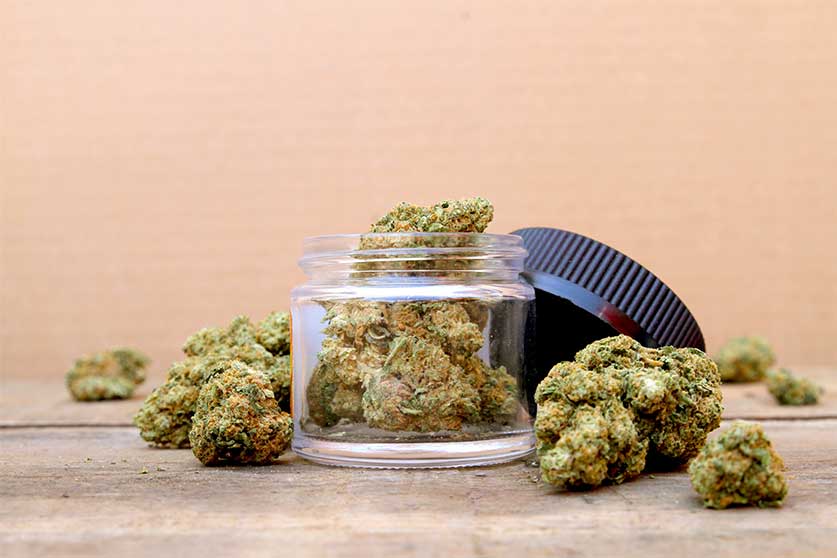Ohio Legalizes Recreational Marijuana | What It Could Mean For Residents
Ohioans age 21 and older may now possess up to 2.5 ounces of marijuana for recreational use. Some people believe this law will create job opportunities and boost tax revenue. Others worry it will increase car crashes, workplace accidents, and rates of marijuana addiction.

On November 7th, 2023, Ohio voters approved a ballot measure legalizing recreational use of cannabis.
The proposed law, known as the The Regulate Marijuana Like Alcohol initiative or Ohio Issue 2, makes Ohio the 24th state to legalize recreational marijuana. It will take effect 30 days after the election. Here’s how it could impact Ohioans.
Understanding Issue 2
The Associated Press called the passage of Issue 2 around 9:30 p.m. on election day, with 56% of Ohioans voting “yes.”
The law allows Ohio residents age 21 and older to possess up to 2.5 ounces of marijuana or 15 grams of marijuana extract for recreational use. They can also grow up to six plants per individual and up to 12 plants per private residence where at least two adults live.
The law is a ballot initiative and not a constitutional amendment. That means state lawmakers may adjust or repeal it. However, Ohio Gov. Mike DeWine, who opposes marijuana legalization, cannot veto the law.
10% Tax
Along with legalizing marijuana, the law imposes a 10% tax on all marijuana purchases. This tax revenue will go toward administrative costs of marijuana regulation, addiction treatment programs, municipalities with dispensaries, and social equity and jobs programs.
Division Of Cannabis Control
The law also establishes a Division of Cannabis Control within the Ohio Department of Commerce. This new state agency will license, regulate, investigate, and penalize adult-use marijuana operators and testing laboratories. The Department of Commerce will finalize the Division’s rules and start issuing licenses within nine months.
The Division will also work with the Department of Mental Health and Addiction Services to create a program for marijuana addiction treatment.
Medical Dispensaries Can Apply For Recreational
The new law follows Ohio’s legalization of medical marijuana in 2016. The state’s first medical marijuana dispensary opened in 2019. These dispensaries will now have the opportunity to apply for recreational marijuana licenses.
Marijuana remains a Schedule I drug, meaning recreational use is still illegal on a federal level. However, the Department of Health and Human Services recently recommended that the Drug Enforcement Administration (DEA) reschedule marijuana and ease regulations on its use.
In 2019, about 18% of Americans used marijuana, making it the most popular federally illegal drug.
How The New Law Could Benefit Residents
Some Ohioans believe this new marijuana law will have a positive effect on the state.
Economic Uptick & Tax Revenue
For example, the Coalition to Regulate Marijuana Like Alcohol, which created the ballot measure, claims it will strengthen the economy.
More specifically, it could create job opportunities and bring back tax revenue from Michigan, which legalized recreational marijuana in 2018.
Proponents of the new law say this tax revenue could help revitalize Ohio’s aging hospitals, schools, and other important buildings.
Indeed, according to a study by the Ohio State University Drug Enforcement and Policy Center, the state could see between $276 million and $403 million in annual tax revenue by year five of marijuana legalization.
How The New Law Could Harm Residents
Other Ohioans oppose the law, including Republican lawmakers such as Ohio Senate President Matt Huffman and House Speaker Jason Stephens.
They fear that legalizing marijuana may increase marijuana-related dangers, including impaired driving accidents.
More Fatal Car Crashes
The organization Protect Ohio Workers and Families claims the passage of Issue 2 will lead to 48 more fatal car crashes and 2,298 more injury crashes. It made these predictions using information from the Ohio Department of Public Safety and the Insurance Institute of Highway Safety.
Like alcohol, marijuana can make you an unsafe driver by impairing your judgment, reaction time, and coordination.
Increase Workplace Injuries
Some people also worry the election results will increase workplace injuries by enabling marijuana use among employees.
However, the new law does not prevent employers from enforcing zero-tolerance drug policies. In other words, an employee who uses legal marijuana at home could still get fired for using the drug at work or for failing a random drug test.
Higher Rates Of Marijuana Addiction
Finally, some residents are concerned that a legal cannabis market could lead to higher rates of marijuana addiction. Marijuana addiction (also called marijuana use disorder) is a disease that makes you feel unable to control your marijuana use. Common symptoms include:
- frequently craving marijuana
- needing increasingly larger amounts of marijuana to feel the desired effects (also called tolerance)
- experiencing withdrawal symptoms, such as anxiety and trouble sleeping, when you don’t use marijuana (also called physical dependence)
- using marijuana in dangerous situations, such as while driving or operating heavy machinery
- continuing to use marijuana even when it causes problems at home, school, or work
When left untreated, marijuana addiction may lead to problems with memory, attention, and learning. It could also increase your risk of psychosis. Psychosis is a temporary loss of connection with reality that involves symptoms like paranoia, hallucinations, and delusions.
If you or someone you love experiences symptoms of marijuana addiction, seek help at an addiction treatment program. These programs provide treatment services like medical detox, behavioral therapy, and support groups to help you regain control of marijuana.
To learn more about addiction treatment, please reach out to Ohio Recovery Center. Our board-certified healthcare providers offer personalized, evidence-based care to help your or your loved one stay sober.
- Associated Press https://apnews.com/article/ohio-marijuana-legalization-election-2023-6d15efb27fdcd41e7364f2b7cd3177f4
- Centers for Disease Control and Prevention https://www.cdc.gov/marijuana/health-effects/addiction.html
- Centers for Disease Control and Prevention https://www.cdc.gov/marijuana/data-statistics.htm
- Ohio Medical Marijuana Control Program https://www.medicalmarijuana.ohio.gov/Documents/ProgramUpdate/program%20update.pdf

